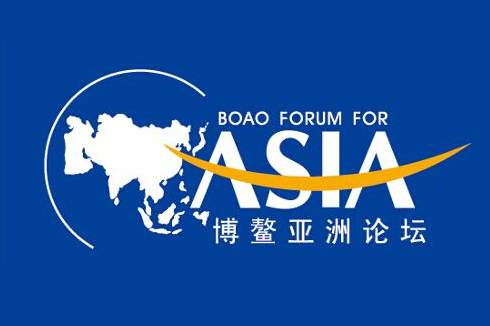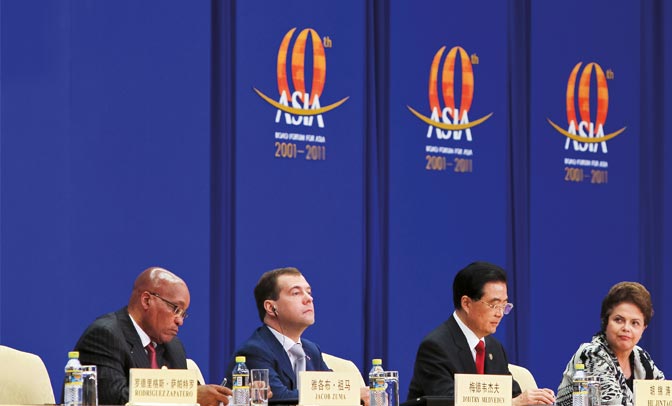
On March 26, the 2015 Boao Forum for Asia (BFA) will welcome policy makers, business leaders and journalists from around the world to Hainan Province. Modeled on the World Economic Forum (WEF) in Davos, the first BFA meeting took place in 2002, and has since then turned into a key element of China’s global public diplomacy strategy (it began as a joint project with other countries, but is now largely controlled by the Chinese government). Contrary to the many other Chinese initiatives that, in their entirety, could create a ‘parallel order‘ — such as the BRICS-led New Development Bank (NDB), the Silk Road Fund, and the Asian Infrastructure Investment Bank (AIIB) — the Boao Forum for Asia falls into the ‘soft power’ category of China’s global strategy.
The Chinese political leadership clearly regards the event as a pillar of the country’s foreign policy. The BFA’s Secretary General is Long Yongtu, who negotiated China’s entrance into the World Trade Organization (WTO). Just like in 2013, Xi Jinping will give the keynote address of the 2015 edition of the event, this time themed “Asia’s New Future: Toward a Community of Common Destiny“. Among the participants have been not only political leaders from the region (more than 10 heads of government and state will address the opening session), but also business leaders like Bill Gates, George Soros or Ratan Tata, who is now member of the BFA’s board. Last year, an additional regional BFA took place in Dubai, regarded as a strategic hub for Chinese investors.
While the BFA’s official focus is to strengthen economic integration in the region (involving numerous working groups and sector-specific discussions on the sidelines of the summit), the forum’s scope has recently expanded, and today helps China set the agenda of the discussions in the region. Two years ago, the BFA began discussing Asia-US relations and food security, both of great importance to China. In 2014, debates included topics such as cyberspace and the role of the United States in the Asia-Pacific region.

BRICS leaders at the 2011 Boao Forum for Asia, which took place together with the second BRICS Summit
RT, a Russian state-funded television network, has somewhat triumphantly claimed that the BFA was on its way to rival the yearly Davos convention. Yet critics are right to point out that the Boao Forum for Asia still has a long way to go before it can challenge the World Economic Forum (WEF) in Switzerland. Contrary to the discussions in the Swiss ski resort, civil society is largely absent from the Chinese tropical island, as are discussions about human rights.
Rather than rivaling Davos, Chinese policy makers’ strategy, for now, is more modest but no less astute: By hosting a vibrant regional forum, it can continuously strengthen its “framing power” — its capacity to frame the debate and redefine ideas and concepts in ways that serves its national interest. That may involve subtle strategies such as omitting a certain topic and promoting another, or by convincing neighboring countries to use the BFA to discuss a specific issue, and not other platforms that involve the United States, such as the Asia-Pacific Economic Cooperation (APEC). These details may seem insignificant at first, but they are certain to enhance China’s capacity to shape discussions in its own favor in the long term, just like the United States shrewdly decides to discuss issues in forums where it possesses the greatest leverage.
For example, in 2012, the West essentially succeeded in stopping the United Nations Conference on Trade and Development (UNCTAD) – dominated by developing countries – from further analyzing the global financial crisis. As a senior U.S. delegate declared in one of the last negotiating sessions in Doha, “We don’t want UNCTAD providing intellectual competition with the IMF and the World Bank.” In effect, the West said, “We do not want UNCTAD to discuss any of these issues, because UNCTAD is not competent to do so. They are for the G20 and IMF.”
The Boao Forum for Asia is thus a notable element of China’s broader effort to engage internationally and slowly increase its autonomy on the global stage. Over the coming yeras, the BFA’s list of participants will be a useful way to measure China’s regional convening power, an important factor in a region that generally remains suspicious of Beijing’s ambitions.
Read also:
Book review: “China Goes Global: The Partial Power” by David Shambaugh
China’s Silk Road Fund: Towards a Sinocentric Asia
Photo credit: Roberto Stuckert Filho








